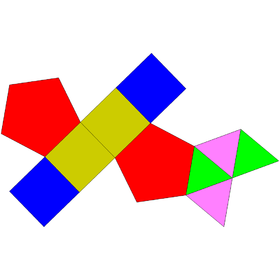Augmented pentagonal prism
Jump to navigation
Jump to search
| Augmented pentagonal prism | |
|---|---|
 | |
| Type | Johnson J51 – J52 – J53 |
| Faces | 2x2 triangles 2x2 squares 2 pentagons |
| Edges | 19 |
| Vertices | 11 |
| Vertex configuration | 2+4(42.5) 1(34) 4(32.4.5) |
| Symmetry group | C2v |
| Dual polyhedron | monolaterotruncated pentagonal bipyramid |
| Properties | convex |
| Net | |
 | |
In geometry, the augmented pentagonal prism is one of the Johnson solids (J52). As the name suggests, it can be constructed by augmenting a pentagonal prism by attaching a square pyramid (J1) to one of its equatorial faces.
A Johnson solid is one of 92 strictly convex polyhedra that is composed of regular polygon faces but are not uniform polyhedra (that is, they are not Platonic solids, Archimedean solids, prisms, or antiprisms). They were named by Norman Johnson, who first listed these polyhedra in 1966.[1]
External links
- ^ Johnson, Norman W. (1966), "Convex polyhedra with regular faces", Canadian Journal of Mathematics, 18: 169–200, doi:10.4153/cjm-1966-021-8, MR 0185507, Zbl 0132.14603.